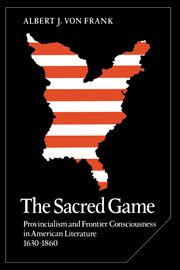Book contents
- Frontmatter
- Contents
- Dedication
- Preface
- Introduction: provincialism and the frontier
- 1 “But enmity this amity did break”
- 2 Brother Jonathan
- 3 “A musy in the thicket”
- 4 Geoffrey Crayon and the gigantic race
- 5 Hawthorne's provincial imagination
- 6 Working in Eden
- 7 Life as art in America
- 8 Reading God directly: the morbidity of culture
- Postscript: tradition and circumstance
- Notes
- Index
- Frontmatter
- Contents
- Dedication
- Preface
- Introduction: provincialism and the frontier
- 1 “But enmity this amity did break”
- 2 Brother Jonathan
- 3 “A musy in the thicket”
- 4 Geoffrey Crayon and the gigantic race
- 5 Hawthorne's provincial imagination
- 6 Working in Eden
- 7 Life as art in America
- 8 Reading God directly: the morbidity of culture
- Postscript: tradition and circumstance
- Notes
- Index
Summary
To open up a subject that was before thought unrewarding, the writer must at the outset convince the reader that a misunderstanding exists. For example, to announce that one's subject is provincialism in American literature is probably to raise an expectation that the discussion to follow will occupy itself only with a small and rejected corner of the national literary culture. So long as provincialism is understood mainly as the disabling liability of backwoods regionalists or self-taught writers of the second rank, such an expectation would indeed be warranted. But the argument of this book is at once broader in scope and, I hope, much less patronizing than such ordinary conceptions of the provincial would allow.
The argument, in brief, is that provincial conditions were not the special case in America before the Civil War but, in fact, quite the ordinary context for artistic expression; as a consequence, they seem largely to account for what appears characteristic or nationally distinctive in the literature. The argument is, further, that these conditions, historically associated with frontier patterns of settlement and cultural transmission, could at times be enriching challenges to American artists, who met them with differing ideals, differing temperaments, and differing strategies.
A number of colleagues at several institutions shared their wisdom with me, which makes this book that much better.
- Type
- Chapter
- Information
- The Sacred GameProvincialism and Frontier Consciousness in American Literature, 1630–1860, pp. vii - viiiPublisher: Cambridge University PressPrint publication year: 1985

